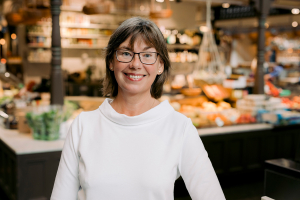Sweden Food Arena enables new collaborations at Nordic Food Industry
 Marie Gidlund works at the Sweden Food Arena, Sweden’s national forum for collaboration between all players in the food value chain. Together with her colleague Kerstin, they are working to build more collaborations around innovation and research to create a sustainable, innovative and competitive food sector. Sweden Food Arena has a natural place at Nordic Food Industry, where it facilitates connections between both industry and research that can lead to new innovation initiatives.
Marie Gidlund works at the Sweden Food Arena, Sweden’s national forum for collaboration between all players in the food value chain. Together with her colleague Kerstin, they are working to build more collaborations around innovation and research to create a sustainable, innovative and competitive food sector. Sweden Food Arena has a natural place at Nordic Food Industry, where it facilitates connections between both industry and research that can lead to new innovation initiatives.
– We can see the need to come together in the industry. The more we work with each other within the industry and across the entire value chain, as well as working with other industries, the more innovation will emerge. It is with the meeting of skills and experience that things happen. The food industry is already an innovative sector, but we need even more high-level innovations that are new for Sweden and, above all, new for the world. We need to ‘think big together’ in meetings where we encounter other skills and knowledge areas, so that we can identify new opportunities, says Marie.
On the agenda for 2022
Marie sees great potential in the forces that exist in Sweden and looks forward to a bright future for the industry.
– We have many fantastic strengths in Sweden that we can capitalise on, such as land, water and industrial know-how. We need to have an export focus in our innovation, because we have great potential to gear up and make a difference with quality food and drink for export, thereby driving growth across the entire food value chain. This industry can become an innovation engine in the 21st century if we seize these opportunities and work together. I’ve also noticed that the focus has increased significantly as a result of the war and the pandemic, she says.
Nordic Food Industry provides a common platform for the food industry to meet. It is a complex industry like no other. At the 2022 edition you can meet Marie at our Innovation Square and learn about the opportunities available around funding support linked to research and innovation initiatives.
– I am looking forward to being able to help bring stakeholders together and find solutions to the challenges that exist. The food industry is so hugely important and yet so complex. There are demanding standards for quality, freshness, safety, origin, content and environmental friendliness, to name just a few aspects. NFI is a meeting place that stimulates new meetings and new ideas. It also performs an important function in challenging the industry to introduce new and unexpected concepts that break with traditional thinking, she says.
“We need to stop thinking so traditionally”
The recent crises have hardly gone unnoticed by the food industry. And despite its challenges, it also gives a clear indication of what needs to be improved.
– In Sweden, we need to be better at bringing knowledge and research from other countries, compiling it and disseminating it to companies. And then make sure we turn it into action. We need to gear up more quickly to keep up both with the increased competition and with the increased pace of change. We also need to be better at working with each other in the value chain and other sectors, and to commission knowledge from academia. Finally, we need to stop thinking so traditionally. Innovation usually comes when people from other sectors step into the food industry, Marie says.
Sweden Food Arena is clear that with the right conditions, the industry has great growth potential. Here are some of the goals they have already formulated:
- Top 3 in innovation rankings within the food sector in Europe.
- 50 new Swedish food innovations with a combined turnover of €1 billion.
- The food sector contributing to the creation of at least 50,000 new jobs in Sweden.
- The food sector’s export share increasing to 50%.
To achieve these goals, it has also developed an innovation and research agenda consisting of five missions that describe the areas in which new knowledge and innovation are needed. These areas also link to the UN climate goals:
- The world’s most attractive food and drink.
- Competitive food innovation.
- Food and drink for a healthier life.
- A resource-efficient food sector.
- Climate-neutral food production.
Their work now involves bringing together companies in the value chain and listening to their needs in different priority areas. These needs are compiled and presented to politicians and authorities, who can target investments and increase funding to the industry. The above missions are formulated in terms of needs and create a direction for the investments that Sweden Food Arena is calling for.